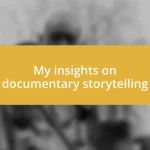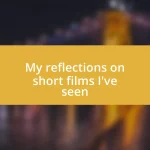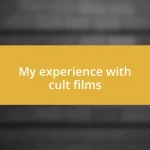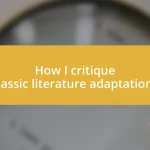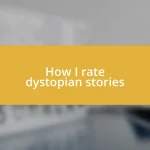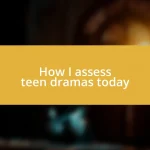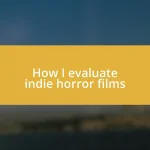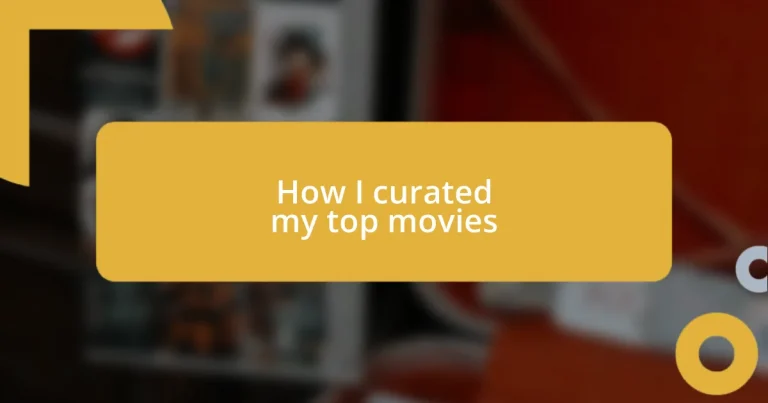Key takeaways:
- Personal movie preferences are deeply influenced by emotions, memories, and childhood experiences, shaping what resonates most with viewers.
- Researching genres, gathering recommendations, and participating in film discussions enhance the movie-watching experience, offering diverse insights and perspectives.
- Critical viewing and reflection on films foster a deeper connection, allowing viewers to explore their own experiences and the broader implications of the narratives presented.
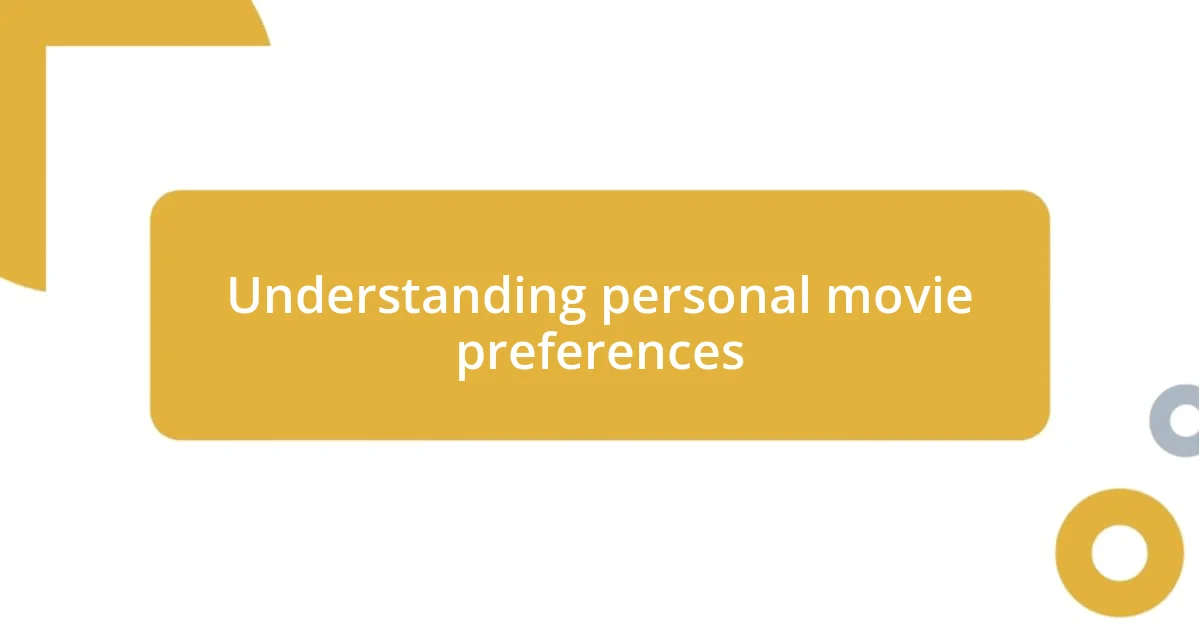
Understanding personal movie preferences
Understanding our personal movie preferences often begins with reflecting on the emotions and memories linked to specific films. For instance, I remember watching “The Pursuit of Happyness” during a particularly challenging time in my life. The struggle and perseverance of the characters resonated with me deeply, shaping my appreciation for stories that highlight resilience and hope.
Have you ever paused to think about how your childhood influences your cinematic tastes? I certainly have. Growing up, my family would gather every Friday night for movie marathons, with classics like “The Princess Bride” and “Ferris Bueller’s Day Off.” The joy and laughter from those moments helped me realize that comedies hold a special place in my heart, reminding me of simpler times full of connection and warmth.
It’s fascinating how different genres can evoke unique reactions based on our experiences. Personally, thrillers often keep me on the edge of my seat, inviting me to confront fears and uncertainties. Yet, there’s something deeply comforting about a well-crafted romantic film that can transport me back to feelings of first love and vulnerability. Don’t you think our preferences reflect not just what we enjoy, but who we are as individuals?
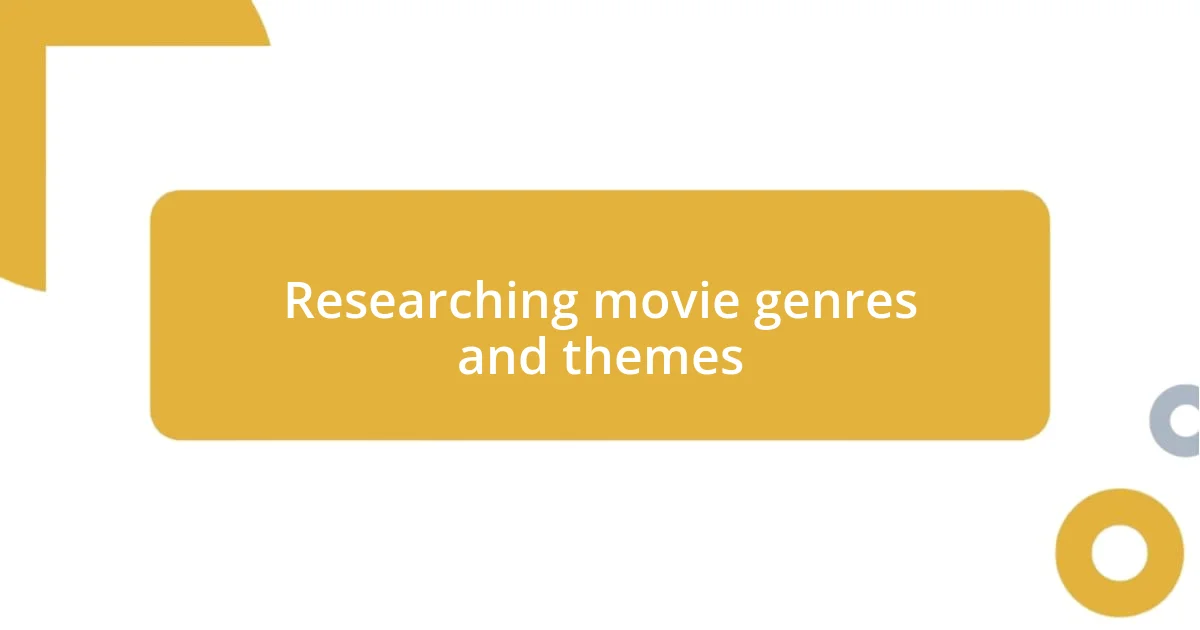
Researching movie genres and themes
Researching movie genres and themes has become a fascinating journey for me, revealing layers of storytelling that resonate deeply with my experiences. When I stumbled upon the concept of “social issue films,” I was captivated by how directors weave narratives that shed light on real-world problems. I recall watching “12 Years a Slave” and feeling an overwhelming wave of emotions — from anger to empathy — as it brought historical injustices into sharp focus. This film ignited my interest in how storytelling can bridge gaps in understanding and create conversations around critical topics.
As I explored various genres, I found it helpful to create lists that captured the essence of what each one offers. Here are a few genres and themes that resonate with me:
- Thrillers: Tension, unexpected twists, and psychological depth.
- Dramas: Emotional journeys that explore the human condition and relationships.
- Documentaries: Real-life stories that educate and inspire change.
- Romantic Comedies: Light-hearted narratives filled with warmth and humor.
- Fantasy/Sci-Fi: Escapism that invites us to dream beyond reality.
Each genre speaks to different aspects of my personality and interests, making the research not just informative but also a reflection of who I am. Engaging with these themes has helped me better understand my connection to cinema and the stories that linger in my heart long after the credits roll.
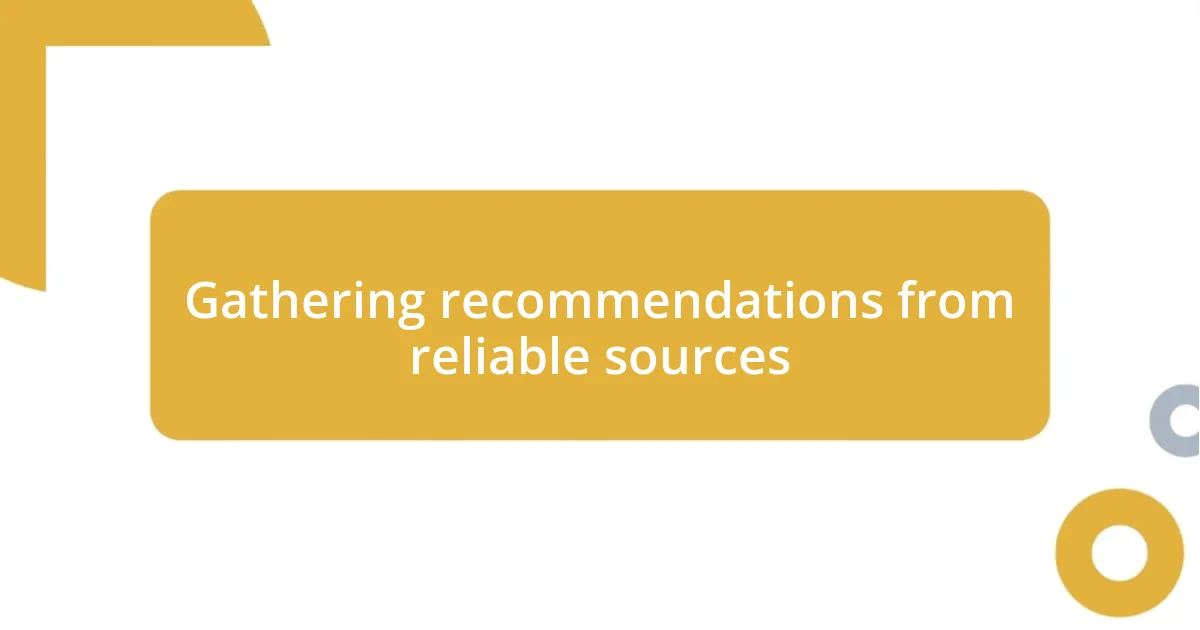
Gathering recommendations from reliable sources
When gathering recommendations, I often turn to reliable sources like critics, film forums, and trusted friends. I remember the excitement I felt when I discovered a podcast dedicated to reviewing classic films; the hosts offered insights and perspectives I hadn’t considered before. Their thoughtful discussion enhanced my appreciation for movies like “The Godfather,” revealing layers I hadn’t noticed during my first viewing. It’s amazing how engaging with knowledgeable voices can elevate the movie-watching experience.
I find that platforms like Rotten Tomatoes or Letterboxd are invaluable in my quest for quality films. For instance, checking out the user ratings and critical reviews for “Parasite” helped me grasp why it became a cultural phenomenon. This combination of statistical ratings and personal reviews gives me a clearer picture of what to expect, which significantly influences my movie choices. Have you tried leveraging movie tracking apps for recommendations? I’ve discovered new favorites simply by exploring curated lists based on my interests.
To enrich my gathering of recommendations, I also value community engagement in film discussions. Participating in online forums and social media groups exposes me to diverse opinions. I recall reading a post where someone passionately compared the visual storytelling of “Blade Runner” with its sequel, and it sparked my interest in revisiting both films back-to-back. Such interactions can be enlightening and sometimes surprising, leading to unexpected gems that may have slipped under my radar.
| Source Type | Benefits |
|---|---|
| Critics’ Reviews | In-depth analysis and professional perspectives |
| Friends’ Recommendations | Personal insights and shared experiences |
| Film Forums | Diverse opinions and community engagement |
| Tracking Apps | Personalized recommendations based on interests |
| Social Media | Immediate feedback and trending discussions |
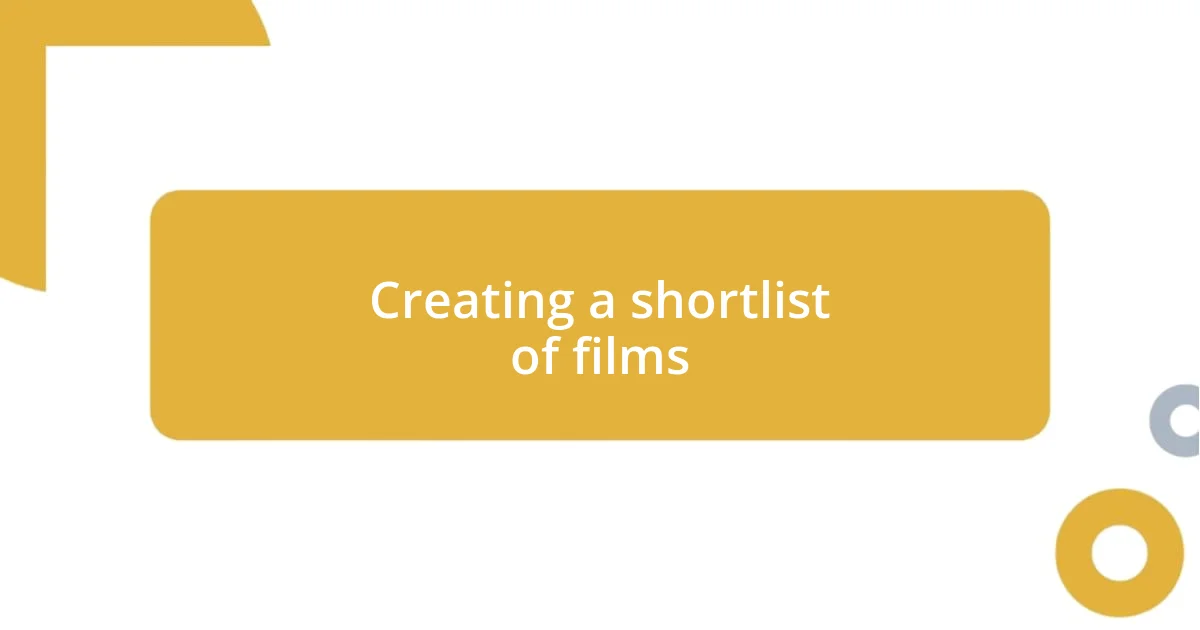
Creating a shortlist of films
Creating a shortlist of films is an exciting yet sometimes overwhelming task. I often start by jotting down titles that immediately come to mind, those that have impacted me in some way. For instance, after watching “Eternal Sunshine of the Spotless Mind,” I felt compelled to explore more films that delve into the intricacies of memory and love. It’s fascinating how certain movies can resonate so deeply that they linger in your thoughts, prompting you to seek out similar themes.
Once I have a preliminary list, I go through my research and recommendations to filter those titles. This process can be incredibly revealing. I remember narrowing down my choices for a movie night by revisiting films like “Moonlight” and “Her” — both of which reflect profound emotional truths. I ask myself, what is it about these films that draws me in? Their exploration of identity and connection makes them stand out amongst the crowd. Is there a theme that resonates with your personal experiences? It’s a reflective journey that brings clarity.
As I refine my shortlist, I consider various factors like the film’s genre, director, or even the atmosphere it evokes. For example, I often gravitate toward visually stunning films that are thought-provoking. This helps me curate a balanced selection, ensuring that I have a mix of genres and styles for different moods. Have you ever found yourself drawn to a film simply because of its compelling visuals? It’s a reminder that the film-watching experience is multidimensional, blending narrative, emotion, and aesthetics into something truly special.
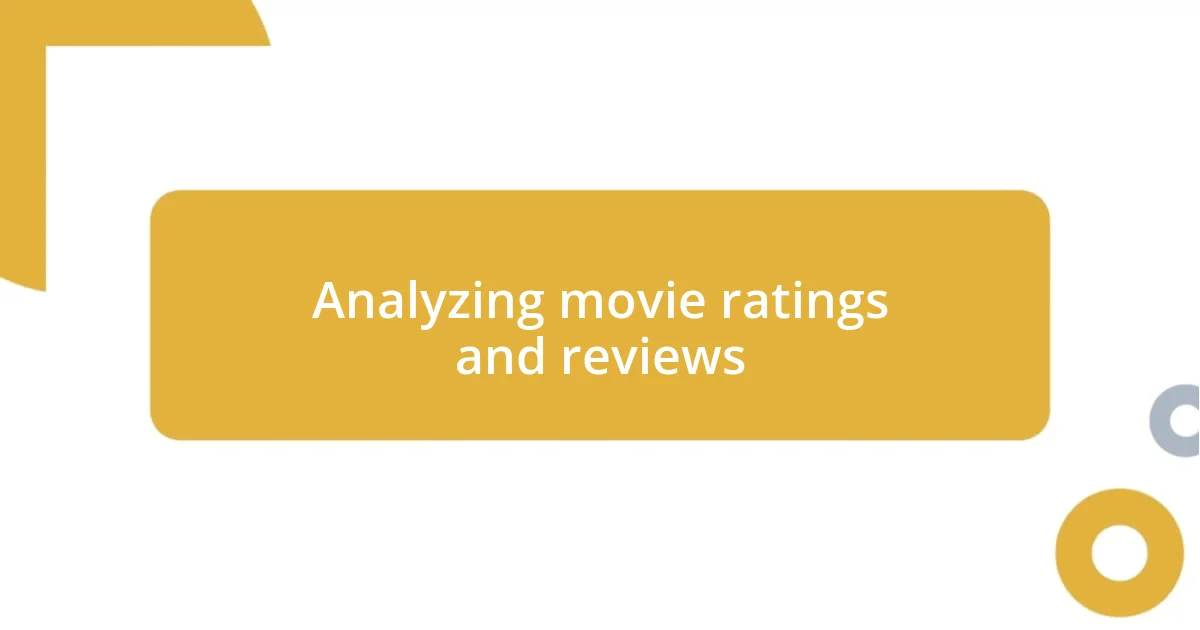
Analyzing movie ratings and reviews
Analyzing movie ratings and reviews is an essential part of my curation process. I often find myself diving deep into the user reviews on platforms like IMDb or Rotten Tomatoes. I remember the time I read a particularly passionate critique of “Mad Max: Fury Road,” where the reviewer highlighted the film’s themes of resilience and survival against the odds. Such insights really add another dimension to my understanding and appreciation of a film, turning it from a mere visual spectacle into something profoundly meaningful.
I also appreciate how aggregate ratings can offer a snapshot of a film’s reception. For instance, when I noticed “Parasite” boasting a near-perfect score, it piqued my curiosity. I wondered what made it resonate so strongly with audiences and critics alike. After watching it and immersing myself in various reviews, I realized that the film’s commentary on class disparity struck a universal chord, making it a conversation starter. How often do we truly reflect on the social issues that movies bring to light? I believe this kind of reflection enriches our film choices and overall viewing experience.
Additionally, I find that reading both positive and negative reviews broadens my perspective. Occasionally, I encounter a review that vehemently disagrees with the general consensus, sparking an interest to see the film through that critic’s lens. A memorable example was reading a scathing review of “Inception,” which argued it was all style and no substance. This contrast encouraged me to re-watch the film with renewed scrutiny. Do you ever find that differing opinions challenge your views and enhance your understanding? I certainly do, as it adds layers to my movie-watching journey, inviting me to explore beyond surface-level impressions.
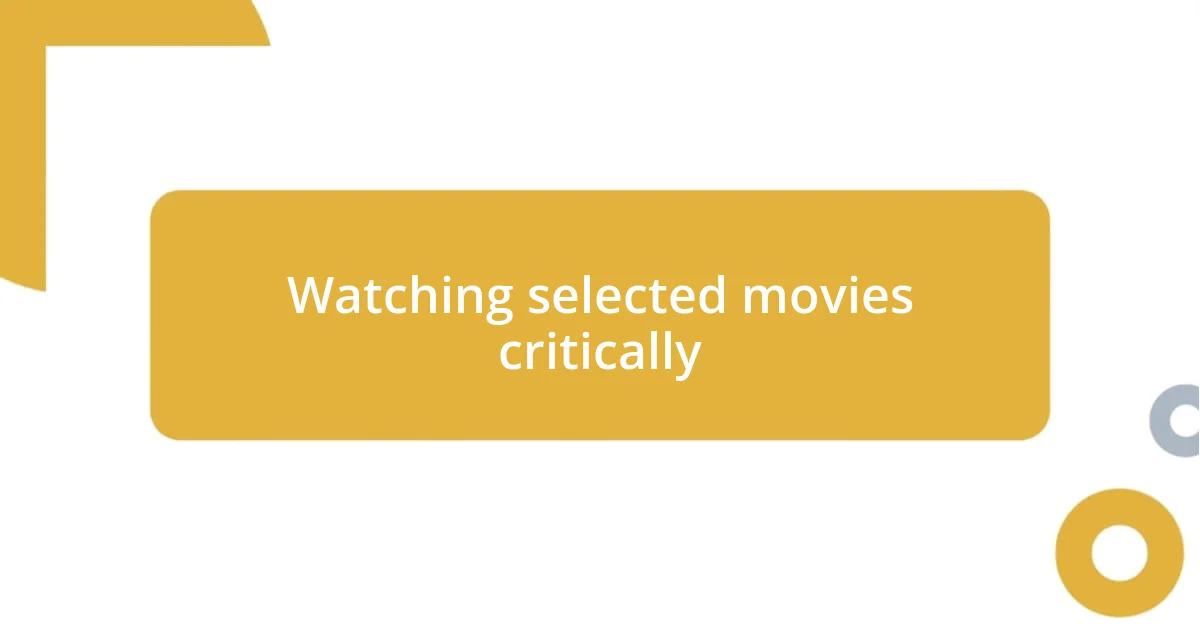
Watching selected movies critically
Watching selected movies critically involves an introspective approach that transcends just sitting through the plot. I remember watching “Gone Girl” and being struck not only by its thrilling twists but also by its commentary on media perception and relationships. It made me question how we often communicate our own narratives and the complexities underlying our motivations. Have you ever paused mid-movie, overwhelmed by a sudden realization about something you’ve experienced in life? I think that deep connection is what makes critical viewing so powerful.
As I engage with films, I like to pay attention to details like cinematography and sound design. For instance, during a recent viewing of “The Lighthouse,” I found myself captivated by how the stark visuals and haunting score amplified the story’s tension. These elements, while often overlooked, can significantly enhance the emotional impact of a film. How much do you think the ambiance of a film affects your overall experience? For me, it’s a fundamental piece of the puzzle — it sets a mood that makes every moment more potent.
Finally, the mental notes I take during a movie help me foster a richer dialogue with the film. When I walked away from “The Shape of Water,” I couldn’t stop pondering its themes of love in unconventional forms. This immediate reflection not only deepens my engagement but also enriches future discussions with friends. It’s fascinating how movies can spark such dialogue, isn’t it? To me, critical watching transforms films from mere entertainment into profound explorations of life, love, and what it means to be human.
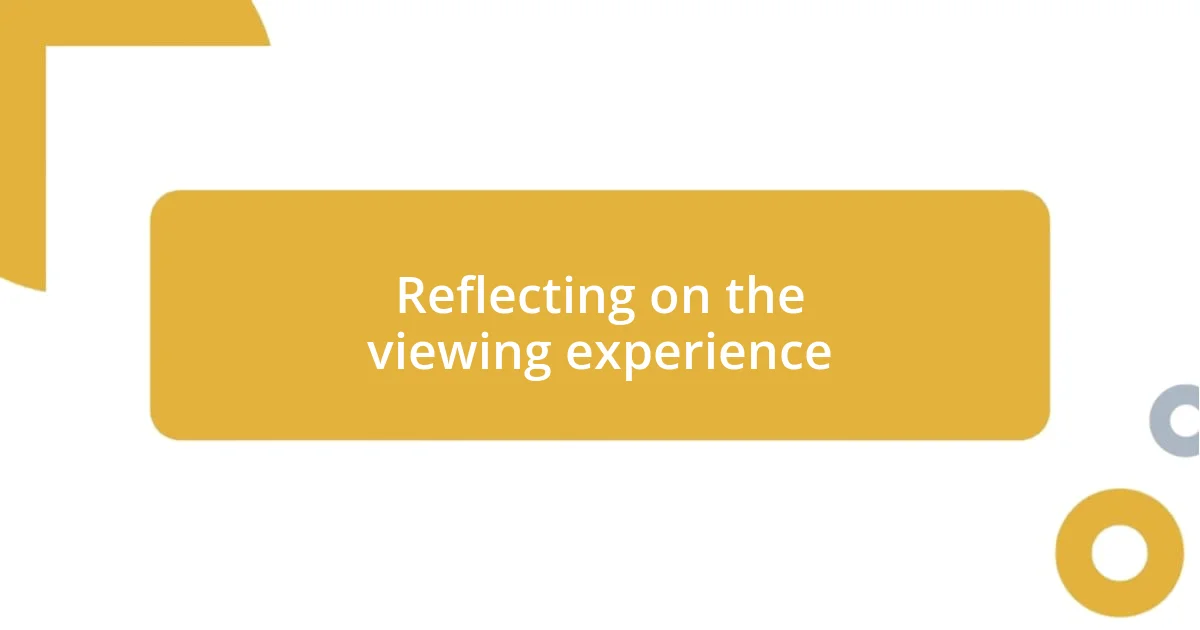
Reflecting on the viewing experience
Reflecting on a viewing experience means embracing both the emotions and thoughts that a film stirs within me. Recently, after watching “Eternal Sunshine of the Spotless Mind,” I couldn’t shake off the feeling of nostalgia mixed with heartache. It forced me to ponder my own past relationships and the memories I’ve chosen to hold onto or forget. Have you ever finished a film and felt like it reflected your own life’s complexities? For me, that’s when a movie truly resonates—when it strikes a chord in my own story.
I also find that discussing a film with others can profoundly enhance my experience. After viewing “The Farewell,” I engaged in a heartfelt conversation with friends, sharing our own experiences of family and loss. Those discussions unraveled layers of the film that I hadn’t noticed beforehand, reshaping my perception. Isn’t it remarkable how sharing insights can deepen our appreciation for a story? I cherish these moments, as they connect me more to the themes presented on screen.
The beauty of reflecting on what I’ve watched doesn’t just lie in understanding the film, but also in how it influences my life. For example, “Spider-Man: Into the Spider-Verse” inspired me to embrace my uniqueness and pursue creativity fearlessly. The expression of individuality struck a powerful note within me that lasted long after the credits rolled. Do you remember a film that inspired a significant change in your perspective? Those transformative experiences elevate cinema from mere entertainment to an essential part of our journey through life.
